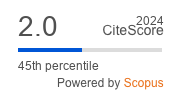Improving plastic management by means of people awareness
DOI:
https://doi.org/10.23726/cij.2019.882Keywords:
Plastic recycling, smart-bin, recycling experience, franchising recycling system.Abstract
In past decades the usage of plastic has seen a tremendous increment. This raise is mainly caused by industrial development and by the spread of this material in every aspect of people life, from food package to aerospace application. For sure plastic has a key role in society and it is not possible to erase, nevertheless its overuse has a serious impact on the environment as well know. In particular, just a few percentage of the total amount of plastic is recycled, the rest has to be landfilled or burnt causing serious pollution side effect. This poor circularity in plastic value chain is mainly caused by difficulties in sorting processes and expensiveness of recycling. By the way a great part of plastic applications could be avoided without implying a reduction in life quality for the people. In addition, a better education in plastic objects shopping and plastic waste management could decrease the difficulties in sorting and recycling. One of the crucial reason why these applications and incorrect behaviour are still present is that the information on alternatives are not present or very hard to be found. In the present paper a novel platform to enhance a more plastic-free life is presented. First a detailed description of the problem is stated, then the process to achieve the proposed solution is described. Finally the very first platform prototype is analysed in details among its functionalities.
Downloads
Published
How to Cite
Issue
Section
License
Authors who publish with this journal agree to the following terms:
- Authors retain copyright and grant the journal right of first publication with the work simultaneously licensed under a Creative Commons Attribution License that allows others to share the work with an acknowledgement of the work's authorship and initial publication in this journal.
- Authors are able to enter into separate, additional contractual arrangements for the non-exclusive distribution of the journal's published version of the work (e.g., post it to an institutional repository or publish it in a book), with an acknowledgement of its initial publication in this journal.
- Authors are permitted and encouraged to post their work online (e.g., in institutional repositories or on their website) prior to and during the submission process, as it can lead to productive exchanges, as well as earlier and greater citation of published work (See The Effect of Open Access).


